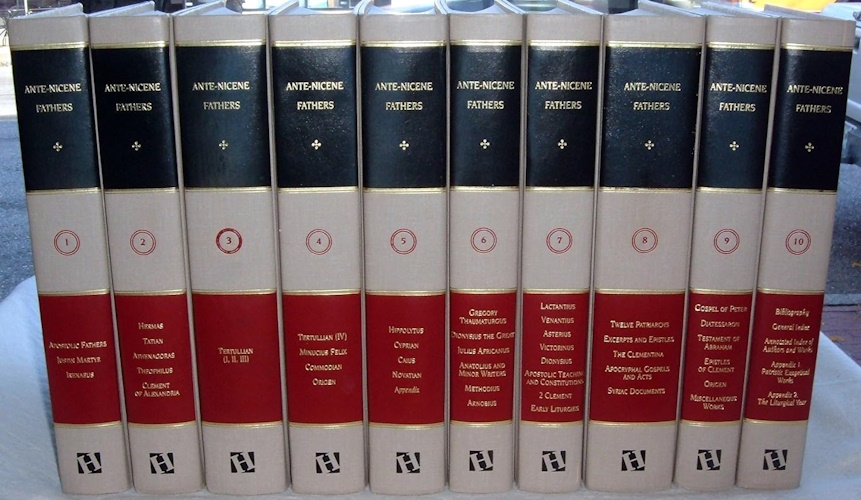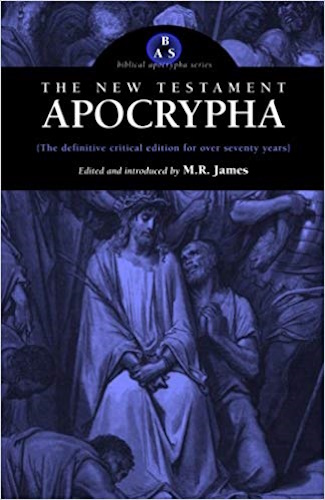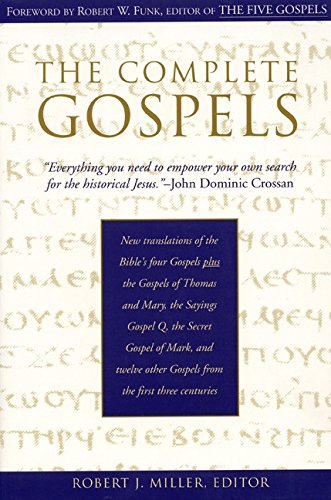

The Pastor of Hermas
Book Third-Similitudes
Similitude Sixth
From: Early Church Fathers 38 Volumes
Ante-Nicene Fathers: The Writings of the Fathers down to a.d. 325 Vol. II
edited by
Rev. Alexander Roberts, D.D., and James Donaldson, LL.D.
Translated by the Rev. F. Crombie, M.A.
The Pastor of Hermas
SIMILITUDE SIXTH.
Of the Two Classes of Voluptuous Men, and of Their Death, Falling Away, and the Duration of Their Punishment.
CHAP. I.
Sitting in my house, and glorifying the Lord for all that I had seen, and reflecting on the commandments, that they are excellent, and powerful, and glorious, and able to save a man's soul, I said within myself, "I shall be blessed if I walk in these commandments, and every one who walks in them will be blessed." While I was saying these words to myself, I suddenly see him sitting beside me, and hear him thus speak: "Why are you in doubt about the commandments which I gave you? They are excellent: have no doubt about them at all, but put on faith in the Lord, and you will walk in them, for I will strengthen you in them. These commandments are beneficial to those who intend to repent: for if they do not walk in them, their repentance is in vain. You, therefore, who repent cast away the wickedness of this world which wears you out; and by putting on all the virtues of a holy life, you will be able to keep these commandments, and will no longer add to the number of your sins. Walk,289 therefore, in these commandments of mine, and you will live unto God. All these things have been spoken to you by me." And after he had uttered these words, he said to me, "Let us go into the fields, and I will show you the shepherds of the flocks." "Let us go, sir," I replied. And we came to a certain plain, and he showed me a young man, a shepherd, clothed in a suit of garments of a yellow colour: and he was herding very many sheep, and these sheep were feeding luxuriously, as it were, and riotously, and merrily skipping hither and thither. The shepherd himself was merry, because of his flock; and the appearance of the shepherd was joyous, and he was running about amongst his flock. [And other sheep I saw rioting and luxuriating in one place, but not, however, leaping about.290]
CHAP. II.
And he said to me, "Do you see this shepherd?" "I see him, sir," I said. "This," he answered, "is the angel291 of luxury and deceit:
page 37
he wears out the souls of the servants of God, and perverts them from the truth, deceiving them with wicked desires, through which they will perish; for they forget the commandments of the living God, and walk in deceits and empty luxuries; and they are ruined by the angel, some being brought to death, others to corruption."292 I said to him, "Sir, I do not know the meaning of these words, 'to death, and to corruption.'" "Listen," he said. "The sheep which you saw merry and leaping about, are those which have torn themselves away from God for ever, and have delivered themselves over to luxuries and deceits293 [of this world. Among them there is no return to life through repentance, because they have added to their other sins, and blasphemed the name of the Lord. Such men therefore, are appointed unto death.294 And the sheep which you saw not leaping, but feeding in one place, are they who have delivered themselves over to luxury and deceit], but have committed no blasphemy against the Lord. These have been perverted from the truth: among them there is the hope of repentance, by which it is possible to live. Corruption, then, has a hope of a kind of renewal,295 but death has everlasting ruin." Again I went forward a little way, and he showed me a tall shepherd, somewhat savage in his appearance, clothed in a white goatskin, and having a wallet on his shoulders, and a very hard staff with branches, and a large whip. And he had a very sour look, so that I was afraid of him, so forbidding was his aspect. This shepherd, accordingly, was receiving the sheep from the young shepherd, those, viz., that were rioting and luxuriating, but not leaping; and he cast them into a precipitous place, full of thistles and thorns, so that it was impossible to extricate the sheep from the thorns and thistles; but they were completely entangled amongst them. These, accordingly, thus entangled, pastured amongst the thorns and thistles, and were exceedingly miserable, being beaten by him; and he drove them hither and thither, and gave them no rest; and, altogether, these sheep were in a wretched plight.
CHAP. III.
Seeing them, therefore, so beaten and so badly used, I was grieved for them, because they were so tormented, and had no rest at all. And I said to the Shepherd who talked with me, "Sir, who is this shepherd, who is so pitiless and severe, and so completely devoid of compassion for these sheep?" "This," he replied, "is the angel of punishment;296 and he belongs to the just angels, and is appointed to punish. He accordingly takes those who wander away from God, and who have walked in the desires and deceits of this world, and chastises them as they deserve with terrible and diverse punishments." "I would know, sir," I said, "Of what nature are these diverse tortures and punishments?" "Hear," he said, "the various tortures and punishments. The tortures are such as occur during life.297 For some are punished with losses, others with want, others with sicknesses of various kinds, and others with all kinds of disorder and confusion; others are insulted by unworthy persons, and exposed to suffering in many other ways: for many, becoming unstable in their plans, try many things, and none of them at all succeed, and they say they are not prosperous in their undertakings; and it does not occur to their minds that they have done evil deeds, but they blame the Lord.298 When, therefore, they have been afflicted with all kinds of affliction, then are they delivered unto me for good training, and they are made strong in the faith of the Lord; and299 for the rest of the days of their life they are subject to the Lord with pure hearts, and are successful in all their undertakings, obtaining from the Lord everything they ask; and then they glorify the Lord, that they were delivered to me, and no longer suffer any evil."
CHAP. IV.
I said to him, "Sir, explain this also to me." "What is it you ask?" he said. "Whether, sir," I continued, "they who indulge in luxury, and who are deceived, are tortured for the same period of time that they have indulged in luxury and deceit?" He said to me, "They are tortured in the same manner."300 ["They are tormented
pagae 38
much less, sir," I replied;301] "for those who are so luxurious and who forget God ought to be tortured seven-fold." He said to me "You are foolish, and do not understand the power of torment." "Why, sir," I said, "if I had understood it, I would not have asked you to show me." "Hear," he said, "the power of both. The time of luxury and deceit is one hour; but the hour of torment is equivalent to thirty days. If, accordingly, a man indulge in luxury for one day, and be deceived and be tortured for one day, the day of his torture is equivalent to a whole year. For all the days of luxury, therefore, there are as many years of torture to be undergone. You see, then," he continued, "that the time of luxury and deceit is very short,302 but that of punishment and torture long."
CHAP. V.
"Still," I said, "I do not quite understand about the time of deceit, and luxury, and torture; explain it to me more clearly." He answered, and said to me, "Your folly is persistent; and you do not wish to purify your heart, and serve God. Have a care," he added, "lest the time be fulfilled, and you be found foolish. Hear now," he added, "as you desire, that you may understand these things. He who indulges in luxury, and is deceived for one day, and who does what he wishes, is clothed with much foolishness, and does not understand the act which he does until the morrow; for he forgets what he did the day before. For luxury and deceit have no memories, on account of the folly with which they are clothed; but when punishment and torture cleave to a man for one day, he is punished and tortured for a year; for punishment and torture have powerful memories. While tortured and punished, therefore, for a whole year, he remembers at last303 his luxury and deceit, and knows that on their account he suffers evil. Every man, therefore, who is luxurious and deceived is thus tormented, because, although having life, they have given themselves over to death." "What kinds of luxury, sir," I asked, "are hurtful?" "Every act of a man which he performs with pleasure," he replied, "is an act of luxury; for the sharp-tempered man, when gratifying his tendency, indulges in luxury; and the adulterer, and the drunkard, and the back-biter, and the liar, and the covetous man, and the thief, and he who does things like these, gratifies his peculiar propensity, and in so doing indulges in luxury. All these acts of luxury are hurtful to the servants of God. On account of these deceits, therefore, do they suffer, who are punished and tortured. And there are also acts of luxury which save men; for many who do good indulge in luxury, being carried away by their own pleasure:304 this luxury, however, is beneficial to the servants of God, and gains life for such a man; but the injurious acts of luxury before enumerated bring tortures and punishment upon them; and if they continue in them and do not repent, they bring death upon themselves."
289 The Vatican has a sentence before this: "For if you sin not afterwards, you will greatly fall away from your former [transgressions]."
290 Found only in Pseudo-Athanasius. It occurs in none of the translations.
291 [The use of the word "angel," here, may possibly coincide with that in the Apocalypse, rebuking an unfaithful and luxurious pastor, like the angel of Sardis (Rev. iii. 1–5). The "yellow" raiment may be introduced as a contrast to the words, "thou has a few names even in Sardis which have not defiled their garments, and they shall walk with me in white."]
292 καταφθοράν, translated in Pal. And Vat. by defectio, apostasy, as departure from goodness and truth. The Æthiopic has "ruin."
293 Of … deceit, omitted in Lips. Our translation is made from the Vat.
294 Pseudo-Athanasius has, "of such men the life is death."
295 Pseudo-Athanasius has, "Corruption, therefore, has a hope of resurrection up to a certain point." [Death here must mean final apostasy (Heb. vi. 4–6, x. 26–31, xii. 15–17). But a certain death-in-life, which is not final, is instanced in Rev. iii. 1; note also 1 John iii. 14, 15, v. 16, 17.]
296 [The idea is, the minister of discipline, as St. Ambrose is represented with a scourge in his hand. The Greek (ἐκ τῶν ἀγγέλων τῶν δικαίων) favours the idea that faithful pastors are here symbolized,—just stewards and righteous men.]
297 βιωτικαί. The Vatican and Pal. render this, "the various punishments and tortures which men suffer daily in their lives." Pseudo-Athanasius has: "For when they revolt from God, thinking to be in rest and in wealth, then they are punished, some meeting with losses," etc. [1 Tim. i. 20. Remedial discipline is thus spoken of, 1 Cor. v. 5.]
298 Pseudo-Athanasius has: "And they cannot bear for the rest of their days to turn and serve the Lord with a pure heart. But if they repent and become sober again, then they understand that they were not prosperous on account of their evil deeds; and so they glorify the Lord, because He is a just Judge, and because they suffered justly, and were punished (ἐπαιδεύθησαν) according to their deeds."
299 The Vatican inserts the following sentence before this: "And when they begin to repent of their sins, then the works in which they have wickedly exercised themselves arise in their hearts; and then they give honour to God, saying that He is a just Judge, and that they have deservedly suffered everything according to their deeds." So does Pal. The Æthiopic becomes very condensed in this portion. [Note this class of offenders, having suffered remedial chastisement, are not delivered over the Satan finally, but "delivered unto me (the angel of repentance) for good training."]
300 τρόπον. The Vat. and Pal. have, "for the same time" (per idem tempus).
301 Omitted in Lips.
302 Pseudo-Athanasius has "nothing" (οὐδέν) instead of ἐλάχιστος.
303 ποτέ. [The pleasures of sin are "for a season" (Heb. xi. 25), at most: impenitence is the "treasuring up of wrath against the day of wrath" (Rom. ii. 5).]
304 [Ps. iv. 6, 7, cxix. 14, lxxxiv. 10. Dr. Doddridge's epigram on Dum Vivimus Vivamus will be brought to mind.]
The Pastor of Hermas - Book Third.—Similitudes.
Similitude Sixth..
Of the Two Classes of Voluptuous Men, and of Their Death, Falling Away, and the Duration of Their Punishment.
![]()
![]()
-
Urantia Book, 44:0.11 - The Celestial Artisans
Never in your long ascendancy will you lose the power to recognize your associates of former existences. Always, as you ascend inward in the scale of life, will you retain the ability to recognize and fraternize with the fellow beings of your previous and lower levels of experience. Each new translation or resurrection will add one more group of spirit beings to your vision range without in the least depriving you of the ability to recognize your friends and fellows of former estates.
-
Princess Bride 1987 Wallace Shawn (Vizzini) and Mandy Patinkin (Inigo Montoya)
Vizzini: HE DIDN'T FALL? INCONCEIVABLE.
Inigo Montoya: You keep using that word. I do not think it means what you think it means. -
Urantia Book, 117:4.14 - The Finite God
And here is mystery: The more closely man approaches God through love, the greater the reality -- actuality -- of that man. The more man withdraws from God, the more nearly he approaches nonreality -- cessation of existence. When man consecrates his will to the doing of the Father's will, when man gives God all that he has, then does God make that man more than he is.
-
Urantia Book, 167:7.4 - The Talk About Angels
"And do you not remember that I said to you once before that, if you had your spiritual eyes anointed, you would then see the heavens opened and behold the angels of God ascending and descending? It is by the ministry of the angels that one world may be kept in touch with other worlds, for have I not repeatedly told you that I have other sheep not of this fold?"
-
Urantia Book, Foreword - 0:12.12 - The Trinities
But we know that there dwells within the human mind a fragment of God, and that there sojourns with the human soul the Spirit of Truth; and we further know that these spirit forces conspire to enable material man to grasp the reality of spiritual values and to comprehend the philosophy of universe meanings. But even more certainly we know that these spirits of the Divine Presence are able to assist man in the spiritual appropriation of all truth contributory to the enhancement of the ever-progressing reality of personal religious experience—God-consciousness.
-
Urantia Book, 1:4.3 - The Mystery Of God
When you are through down here, when your course has been run in temporary form on earth, when your trial trip in the flesh is finished, when the dust that composes the mortal tabernacle "returns to the earth whence it came"; then, it is revealed, the indwelling "Spirit shall return to God who gave it." There sojourns within each moral being of this planet a fragment of God, a part and parcel of divinity. It is not yet yours by right of possession, but it is designedly intended to be one with you if you survive the mortal existence.
-
Urantia Book, 1:4.1 - The Mystery Of God
And the greatest of all the unfathomable mysteries of God is the phenomenon of the divine indwelling of mortal minds. The manner in which the Universal Father sojourns with the creatures of time is the most profound of all universe mysteries; the divine presence in the mind of man is the mystery of mysteries.
-
Urantia Book, 1:4.6 - The Mystery Of God
To every spirit being and to every mortal creature in every sphere and on every world of the universe of universes, the Universal Father reveals all of his gracious and divine self that can be discerned or comprehended by such spirit beings and by such mortal creatures. God is no respecter of persons, either spiritual or material. The divine presence which any child of the universe enjoys at any given moment is limited only by the capacity of such a creature to receive and to discern the spirit actualities of the supermaterial world.
-
Urantia Book, 11:0.1 - The Eternal Isle Of Paradise
Paradise is the eternal center of the universe of universes and the abiding place of the Universal Father, the Eternal Son, the Infinite Spirit, and their divine co-ordinates and associates. This central Isle is the most gigantic organized body of cosmic reality in all the master universe. Paradise is a material sphere as well as a spiritual abode. All of the intelligent creation of the Universal Father is domiciled on material abodes; hence must the absolute controlling center also be material, literal. And again it should be reiterated that spirit things and spiritual beings are real.
-
Urantia Book, 50:6.4 - Planetary Culture
Culture presupposes quality of mind; culture cannot be enhanced unless mind is elevated. Superior intellect will seek a noble culture and find some way to attain such a goal. Inferior minds will spurn the highest culture even when presented to them ready-made.
-
Urantia Book, 54:1.6 - True And False Liberty
True liberty is the associate of genuine self-respect; false liberty is the consort of self-admiration. True liberty is the fruit of self-control; false liberty, the assumption of self-assertion. Self-control leads to altruistic service; self-admiration tends towards the exploitation of others for the selfish aggrandizement of such a mistaken individual as is willing to sacrifice righteous attainment for the sake of possessing unjust power over his fellow beings.
-
Urantia Book, 54:1.9 - True And False Liberty
How dare the self-willed creature encroach upon the rights of his fellows in the name of personal liberty when the Supreme Rulers of the universe stand back in merciful respect for these prerogatives of will and potentials of personality! No being, in the exercise of his supposed personal liberty, has a right to deprive any other being of those privileges of existence conferred by the Creators and duly respected by all their loyal associates, subordinates, and subjects.
-
Urantia Book, 54:1.8 - True And False Liberty
There is no error greater than that species of self-deception which leads intelligent beings to crave the exercise of power over other beings for the purpose of depriving these persons of their natural liberties. The golden rule of human fairness cries out against all such fraud, unfairness, selfishness, and unrighteousness.



































